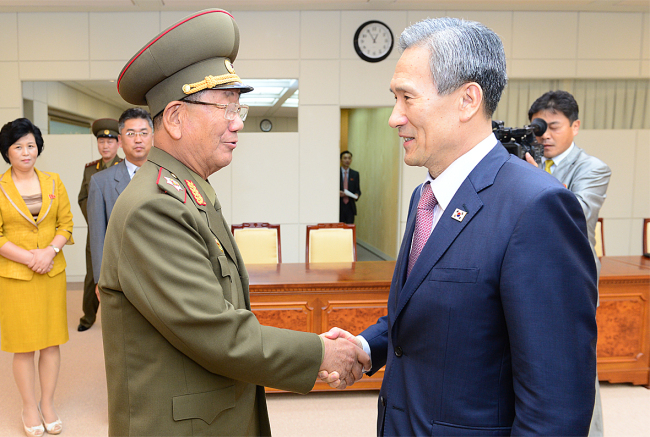North Korea may return to dialogue, responding to a South Korean olive branch Monday, but even so, the talks are unlikely to produce meaningful results toward easing tensions on the peninsula, experts said Monday.
The communist country would challenge South Korea’s dialogue initiative by bringing up issues that are almost certain to be rejected by the South, such as the suspension of South Korea-US joint military exercises and repatriation of North Korea defectors living in the South, experts added.
On Monday, the Defense Ministry proposed to North Korea that the two sides hold inter-Korean military talks Friday at the North’s building in the truce village of Panmunjeom. This coincided with a separate proposal on the resumption of Red Cross talks for the reunion of separated families during the Chuseok holiday in October.
“There is a 50 percent chance of the North accepting the talks and another 50 percent chance of it making a counterproposal for expanded talks on political-military issues,” said Yang Moo-jin, a professor at the University of North Korean Studies.
“North Korea has made clear that the political-military agenda should be addressed first before social-cultural exchanges. It might bring up the issue of the (South Korea-US) joint military drills and US forces stationed in South Korea.”
 |
South Korea`s former security chief Kim Kwan-jin(right) and his North Korean counterpart Hwang Pyong-so. Yonhap |
North Korea has long demanded suspension of the allies’ annual military drills and US deployment of strategic assets as a precondition for inter-Korean dialogue. South Korea and the US have dismissed the demand, saying that the measures are defensive in nature.
Kim Yong-hyun, a professor of North Korean studies at Dongguk University, who also served as an adviser for President Moon Jae-in’s de facto transition team, said if North Korea was ever to agree to the talk, it would only do so to press its own agenda.
“North Korea would ask for repatriation of its defectors and suspension of the upcoming Ulchi Freedom Guardian Exercise.” Kim said, referring to the computerized military drill scheduled to take place in late August. “I suspect the North would come to the table to discuss the very issues.”
The experts agreed that as far as the proposal for military talks is concerned, there might be strong incentive for the North to come to the negotiation table: South Korea’s propaganda loudspeaker broadcasts at the heavily armed border.
North Korea has constantly demanded South Korea do away with the loudspeakers, which blare news of the outside world and criticism of the North’s leader Kim Jong-un, as well as South Korean pop music, toward the tightly controlled regime.
North Korea threatened to take down the loudspeakers in August 2015 when South Korea began the broadcasts after its border guards were maimed by land mines, purportedly planted by the North. The two Koreas later agreed to stop the broadcasts, but South Korea resumed them in January 2016 when North Korea tested what it claimed was a hydrogen nuclear bomb.
“North Korea is all about securing its system and protecting the dignity (of Kim Jong-un),” professor Yang said. “I believe North Korea will acknowledge that (holding inter-Korean talks) is an urgent and necessary matter.”
Some analysts asserted that the government should be cautious about using the halt of the loudspeakers as leverage to bring the North to talks, because once halted, resuming it would be difficult.
“It would take a lot of money to redeploy such massive equipment. … Moreover, I don’t think there is enough public consensus over what kinds of provocations would allow us to restart propaganda loudspeakers,” Park Hwee-rhak, a political science professor at Kookmin University.
“Resuming talks with the North is one thing, but preparing for its nuclear weapon is another. The government really needs to work hard on that. Otherwise, North Korea would take advantage of us and we would not get what we want during talks.”
By Yeo Jun-suk (
jasonyeo@heraldcorp.com)
(
jasonyeo@heraldcorp.com)








